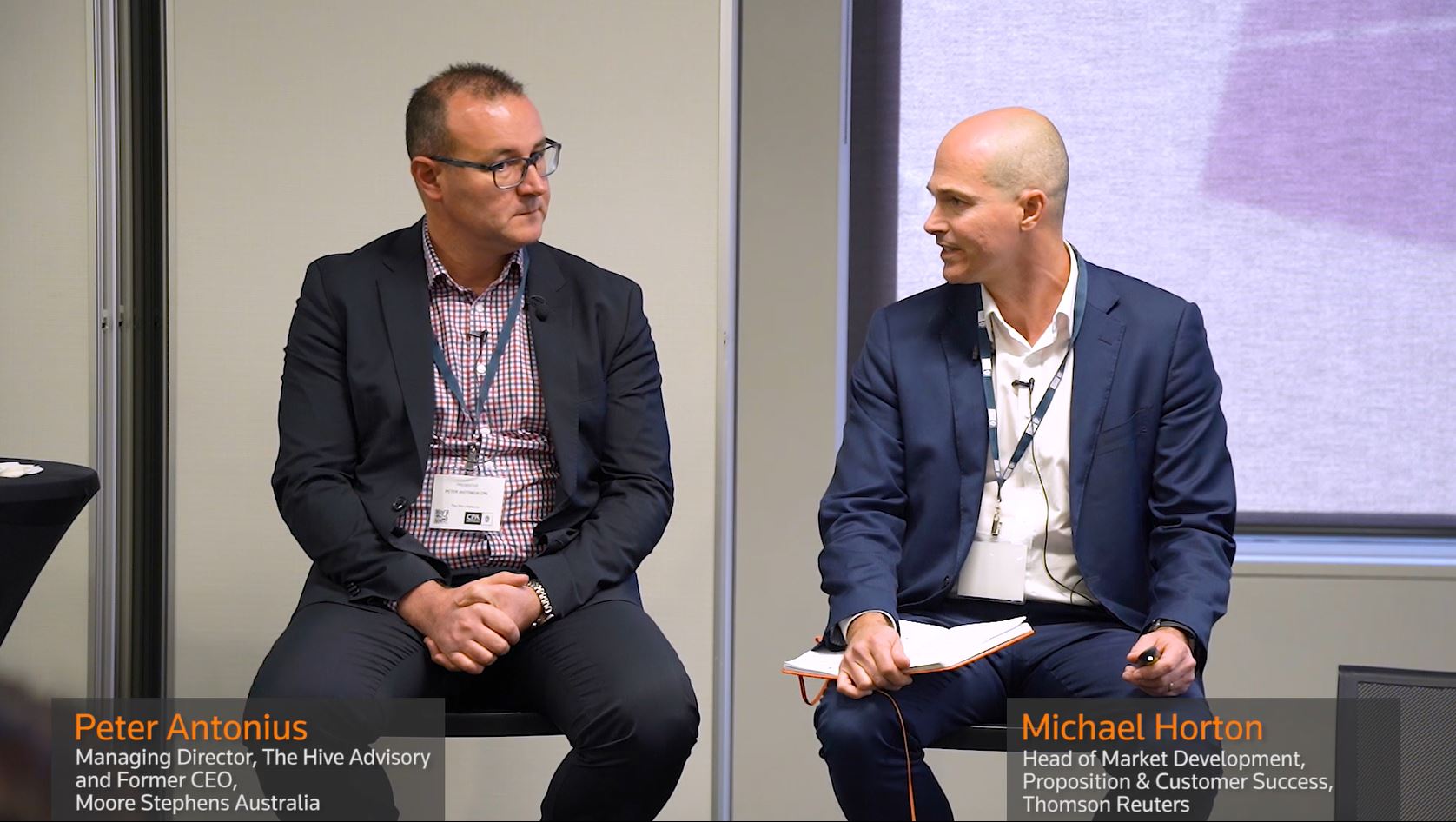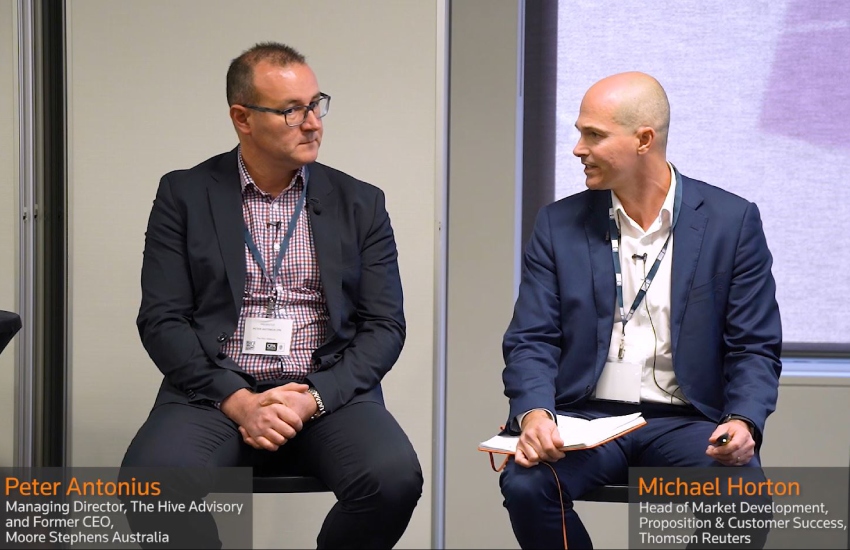
Rate of technological change
Technological change may be the biggest disrupter in the accounting market and industry, but according to Peter Antonius, it’s providing a golden opportunity for the future of accounting.
“We’re quickly recognising that technology is both a disrupter but it’s also an opportunity for us to use it in a way that better enables us to do the things we need to do, to service our clients and hopefully free up our time to do other things in our lives.”
With so many offerings in the market the challenge for practitioners in small firms says Antonius is to cut through the “noise” to find solutions that will work best for them.
“You need to work with reputable and trusted platforms and [software] products to ensure you’re getting the right outcome.”
So, let’s look at the prime technological changes – the cloud and practice management solutions.
Take me to the Cloud
Where once there was a reluctance among small practices to consider moving to the cloud, that’s all changed in the last five years, reflects Antonius, former CEO of Moore Stephens.
“It seems now everyone is open to adopting cloud technology.”
For good reasons.
It provides security over backup, and security over ensuring you’ve got the latest version of the software you’ve subscribed to. And it frees up physical office space.
“If you’re in CBD in Melbourne or Sydney or anywhere – that’s precious footprint you’re paying good rent for when you could actually be utilizing the Cloud.
“These days most people should be looking at the cloud rather than a desktop, on-premise type of solution,” advises Antonius.
And, adds Michael Horton, Cloud lets you work at anytime, anywhere, that’s an invaluable commodity these days in the work environment.
Practice management solutions
The other game-changer in the technology sphere is sophisticated practice management solutions that maximise the efficiency of small practices.
“Everyone’s looking for the ‘connected practice’,” says Antonius, where all the management systems are linked in an ‘ecosystem”.
It’s this integrated ecosystem that Thomson Reuters has designed for small practices, based on demand from practitioners. The first customer to sign up for the new Onvio practice management system found $2,000 of unbilled time that was not processed through the system.
“So, that more than paid for the cost of the system!” said Horton.
Time and money
The benefit of these technological changes is that it’s not just money that’s being saved.
“The dividend from all this is time,” says Horton.
So, the challenge is where to re-invest that time, to make the most of it for your practice?
Focus your new time on running your practice better – and better serving your clients, that’s where the technology can add value, says Antonius.
Compliance – the rich “oil”
Compliance will still be part of practice, but it’s more critical than ever that the compliance process is “as effective and efficient as possible,” stresses Antonius. As it evolves, it is the data – the so-called rich “oil” – that it generates that will be the most valuable part of the process. That data will allow you to have a better business conversation with your clients and to identify areas where you can add the greatest value.
Rate of regulatory change. Watch Video.
After technological change, the second greatest disrupter for the accounting profession is regulatory change.
With a federal tax system that’s reportedly the most complex in the world, that’s not surprising.
So how do firms stay on top of the changes for their practice and their clients, and find the right answers?
Citing his experience at Moore Stephens, Antonius took these questions to Thomson Reuters. Their response was to develop one consistent, standardised source of technical information through the Checkpoint platform, easily accessible by staff across the national firm.
With staff trained to use the platform, information is available at their fingertips, to be accessed anytime, anywhere, says Antonius.
And the benefits? Once again, time and adding value.
Horton explains that TR’s Onvio Tax product integrates this content into both the software and workflow solutions in a practice, with a plan to draw on the content to resolve sticking points in the tax return process and to inform the user about the latest news developments that may affect the data being inputted. TR has already launched Audit Alert, software that will alert the user to issues in the tax return that may attract an ATO audit.
Using intuitive software that can help the adviser better do their tasks. “That's really the future isn't it?” says Antonius.
Changing customer expectations. Watch Video.
“What we’re seeing now is that our clients want us to be available often when it suits them. It can be any hour any time of the day. But I think importantly it's about setting your practice up to ensure that you can deliver – efficiently and effectively.”
Historically, clients have viewed their accountants as trusted, go-to advisers for matters that may fall within or out of their practice. If clients are looking for insurance, a will, or a mortgage, it’s easy to refer them to a specialist within your trusted network.
Pivot to deliver advisory services
So perhaps, suggests Antonius, the time has come to stop underservicing your clients and to take advantage of this trusted position to push more to offering advisory services to add value.
But how do the firms pivot to be able to deliver those services successfully? “That’s where the data, the technology and the systems all come into play,” explains Antonius, allowing you and your staff more informed time with your clients, to help them run their business.
Ask questions, have quarterly meetings, walk the floor of your clients’ business, find the pain points, be the business coach and mentor for your client, he advises.
Marketing material with your own spin
You’ve got plenty of time to write your own marketing copy for clients, right?
If this is a no, Antonius is an advocate of Checkpoint’s white label material that gives you articles and social media content on the latest accounting issues, ready to share with clients, or to be flavoured with your own spin.
Getting the best staff. Watch here.
Attracting the best staff is all about taking on the technology of the future. But once recruited, often there can be a disconnect between their technical and practical knowledge.
To bridge this gap, TR’s new e-learning program is structured to guide staff through sample transactions, in the context of workflow, using tools like checklists and “pulling in the principles at the relevant places,” says Horton.
And the future is?
Bright, according to Antonius, for those who are ready for the challenge to leverage technology and move into the world of advice.
“The people that can change and embrace advice and advisory offerings will be the ones that will succeed,” concludes Antonius.
Virginia Ginnane
Tax Writer at Thomson Reuters
Learn more
Call 1800 074 333 or visit tax.thomsonreuters.com.au/practice-solutions for more information or to sign up for a free demonstration.
 Login
Login








You are not authorised to post comments.
Comments will undergo moderation before they get published.